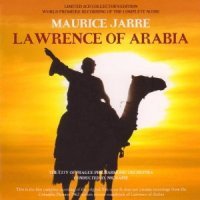- Composed by Maurice Jarre
- Tadlow Music TADLOW012 / 2010 / Score 77:34 / Bonus disc 71:04
David Lean’s Lawrence of Arabia routinely appears at the top of people’s lists of favourite films, completely unsurprisingly. Boasting one of the great cinematic performances, from Peter O’Toole, the film recounts the Arabian adventures of T.E. Lawrence, as he helps to organise the very revolt against the Turks he had been sent to investigate as a young intelligence officer during the first world war. Robert Bolt’s screenplay is full of humour and mischief; Freddie Young’s cinematography simply legendary. Legendary, too, is Maurice Jarre’s score, the first of his four for the director and indeed his first score for any particularly noteworthy film outside France.
The score is, of course, best-known for its simply magnificent main theme, deservedly one of the relatively few film themes to have passed completely into popular culture. Sweeping, romantic, absolutely sun-drenched, it has in fact become the definitive “sound of the desert” for many – and it takes pride of place in the score right from the start. The most famous timpani passage in film music opens the “Overture”, before Jarre presents that theme for the first time – exciting, exotic, stirring – insert complete list of film music reviewers’ favourite adjectives here. The opening piece also incorporates Kenneth J. Alford’s “The Voice of the Guns”, used later in a key moment in the film.
For all its splendour and majesty, in fact that famous “desert theme” isn’t my own personal favourite from this score – that distinction is held by what this album’s liner notes call the “British theme”, introduced in the “Main Titles”. A sprightly piece which emerges from the cue’s somewhat dissonant opening, Jarre alternates it with the main theme through the cue, to produce what I consider possibly my personal favourite piece of film music. The theme is used sparingly through the score, but its appearance always more than welcome to these ears.
The next major theme appears in the next cue, “First Entrance to the Desert”, a gorgeous flute theme initially used by Jarre as a kind of spiritual contemplation of what may be in store (though actually this first use of the theme was not included in the film). “Night and Stars” introduces one of the score’s other main features, with zither and three Ondes Martenots included in the orchestral palette. The Ondes is of course now pretty familiar to a lot of film music listeners (thanks primarily to Jarre and Elmer Bernstein), but at the time must have seemed pretty unusual to audiences – but the ethereal sound that Jarre conjured for this and other sequences using the unusual instruments was perfect. Jarre takes ethereal to new extremes later in the score, through the unusual vocals he employs in “On to Akaba”.
The more action-orientated parts of the film are generally accompanied by one of two themes (Jarre’s flair for percussion – before taking up his career as a composer he had been a percussionist – being put to full use in this score to drive it forward on numerous occasions). First, the “B-section” (if I may call it that) of the main theme itself; second, a thunderous procession of brass perhaps best heard in “The Horse Stampede”, a title which sums up the music in question very well. Thunderous is also a perfect adjective to describe the finale, which draws the score to a (predictably) rousing conclusion.
Lawrence of Arabia has been released on CD several times before – the original soundtrack album featured half an hour’s music but the 1962 recording didn’t particularly do it justice. Silva Screen commissioned a re-recording in 1992, Tony Bremner conducting the Philharmonia Orchestra in about 50 minutes of music from the score. While admired by many, some still felt there were areas of disappointment with the recording. This 2010 release is the first recording of the complete score, James Fitzpatrick’s Tadlow Music label having newly recorded it with the City of Prague Philharmonic conducted by Nic Raine. It’s probably Tadlow’s finest release so far, a wonderfully-authentic recording of the music revealing depths I had never experienced in any of the other releases – depths both in the music and in the recording (for one thing, you can actually hear the Ondes).
Informative liner notes by Frank K. DeWald add to the package, but Tadlow being Tadlow it doesn’t stop there. Even though the complete score (just about) fits on to one disc, Fitzpatrick chose to include a second CD, subtitled “The Music of Maurice Jarre – A Personal Choice”, featuring music the producer feels best summarises the remarkable output of his friend Jarre, who sadly passed away in 2009. Some of the pieces will be familiar to most, others will not. Perhaps the highlight is a new “Symphonic Dance Suite” from The Magician of Lublin; but there are many other highlights, including a gorgeous suite of music from The Fixer.
Jarre was one of the finest film composers; this album makes a wonderful tribute to him. His uniquely French romantic outlook on life simply oozes through so much of his music, his gift for sweeping melodies rivaled by very few of his peers. The remastered DVD of Lawrence of Arabia which came out a few years ago proudly displays a quote from Steven Spielberg calling it “A miracle of a film.” It certainly is – and Maurice Jarre’s timeless, magnificent music is, in equal measure, a miracle of a score. Finally there is a recording which does it justice and this is one of 2010’s finest releases for film music fans. *****
Buy Lawrence of Arabia from Amazon.com and help support movie-wave.net by following this link.














It‘s quiet in here! Why not leave a response?